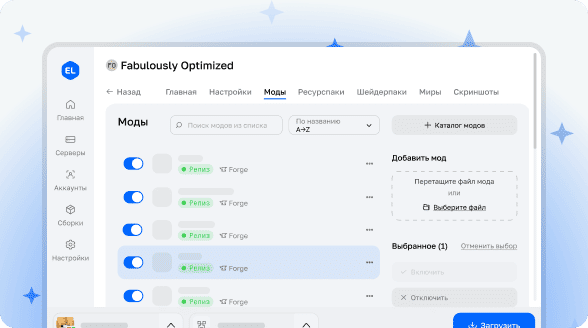

Overflowing Bars
The Overflowing Bars mod presents a revolutionary solution for displaying health, armor, and toughness indicators in Minecraft. This compact and intuitive mod replaces numerous other interface extensions, offering everything needed in a single package.
Key Features
Smart Indicator Display
The system uses only two colors: the standard vanilla color plus orange and light blue for additional layers. A number displayed next to the bars shows the count of stacked layers, eliminating the need to guess values from colors.
Multi-layer Health Display
When you have more than 10 hearts, additional hearts are layered on top of the basic ones. Additional layers are always displayed in orange, maintaining interface compactness.
Intelligent Armor System
With more than 20 armor points, additional points are layered. Additional layers are displayed in light blue. Only necessary armor icons are shown, saving screen space.
Armor Toughness Display
Adds an armor toughness indicator right above the hunger bar. This indicator works similarly to the armor bar and can be moved to the left according to your preference.
Additional Improvements
The mod also fixes the issue where incoming chat messages cover the armor bar. All parameters are fully customizable: you can change layering behavior, number display, and much more.
Compatibility
For full support of armor and toughness values above 20, it's recommended to install the AttributeFix mod by DarkhaxDev.
Visual Examples



Installation
INSTALLATION REQUIRED ON CLIENT
REQUIRES PUZZLES LIB TO BE INSTALLED (FABRIC & NEOFORGE)
REQUIRES FABRIC API TO BE INSTALLED (FABRIC)
REQUIRES FORGE CONFIG API PORT TO BE INSTALLED (FABRIC)
Configuration
If available for a mod, configuration is possible directly in-game using the mod menu (requires Mod Menu by Prospector to be installed on Fabric). On older Minecraft versions, installing Forge Config Screens is also required.
For manual configuration using a text editor, all files are found in the .minecraft/config folder and are named MOD_ID-client.toml, MOD_ID-common.toml, or MOD_ID-server.toml depending on the configuration type. Not all types may exist for a particular mod.

